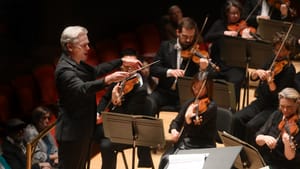Stay in the Loop
BSR publishes on a weekly schedule, with an email newsletter every Wednesday and Thursday morning. There’s no paywall, and subscribing is always free.
Pulling out the stops
The Philadelphia Orchestra presents organist Paul Jacobs

Step aside, Hugh Jackman. If anyone deserves to be called the greatest showman, it’s organ virtuoso Paul Jacobs, who returned to the Philadelphia Orchestra this past weekend for the local premiere of a witty, memorable work written specifically for him.
Standard repertory concertos for organ are not numerous—at least not since the invention of the modern piano. But when you have an artist as creative and individual as Jacobs, it makes sense that a composer would go out of his way to furnish new works for such a talent. Michael Daugherty’s symphonie concertante Once Upon a Castle allows Jacobs to flaunt the full extent of his artistry, while still leaving his partners in the orchestra with plenty of juicy material to relish.
Inspired by Citizen Kane
Daugherty, a professor of composition at the University of Michigan, took his inspiration from Citizen Kane; his self-authored program notes refer to Orson Welles’s model for the title character, William Randolph Hearst. The entire work unfolds with a sense of cinematic sweep, along with a sly melding of these factual and fictional men.
The first movement depicts Hearst Castle—a raucous, occasionally coarse cathedral of sound that mirrors the decadent, profligate cathedral of wealth. Under conductor Edward Gardner’s baton, the orchestra summoned the sweeping winds and radiant warmth of California’s San Simeon mountains, while Jacobs’s thunderous organ intruded like a brash, vulgar arriviste. Natural beauty and manmade hubris joined hands.
This section found its corollary in the concluding movement, which paints a picture of the fictional Xanadu, home of Charles Foster Kane, as a wild, uncontrollable bacchanal. Yet even within this state of abandon exist echoes of Kane’s sad, hardscrabble childhood, mostly rendered through the mournful weight of Jacobs’s organ. Not content to be merely clever, Daugherty engenders a profound sense of emptiness and loss. Even as gleeful music swirls all around it, the organ—and what it represents—stands alone.
Elsewhere, Jacobs and concertmaster David Kim trade pithy solo lines that represent a squabbling argument between Kane and his wife, Susan. The organ’s bass pedals and the violin’s upper register offer intriguing instrumental analogs to male and female voices. Kim, whose sound can sometimes seem dry and practiced in solos, clearly relished the opportunity to duet with a partner as footloose as Jacobs—his intonation remained technically perfect, as always, but his manner seemed carefree.
Daugherty, who was in attendance, earned a well-deserved standing ovation at the end of the concertante’s 25 minutes, and Jacobs earned a well-deserved encore. (Bach, of course.) Literally and figuratively, he pulled out all the stops.
Enduring works, great artists
Gardner, in his local debut, bookended Once Upon a Castle with two of the most enduring works of the British classical repertory. Benjamin Britten’s Sinfonia da Requiem showed the conductor’s deft skill at controlling dynamics and building narrative, as clusters of instruments are introduced and ultimately merge together with terrifying power. Britten, a committed pacifist, composed this symphony/tone-poem hybrid on the eve of World War II, and the music is shot through with a sense of existential dread. The orchestra’s rendition was appropriately unsettling, destructive, and cautiously hopeful.
The program concluded with Elgar’s Variations on an Original Theme, Op. 36 (“Enigma”), performed with the right amount of elegance and repose. Many will recognize the familiar “Nimrod” variation, which is often excerpted and quoted, and likely know the other fourteen modifications less well. Gardner, conducting from memory, made a case for the work as a unified whole.
At the second of three performances, attendance was unusually sparse. What a shame for those who missed such an intriguing program. Gardner—the incoming principal conductor of the London Philharmonic Orchestra and former music director of the English National Opera—is not as well-known on these shores as his conducting compatriots Simon Rattle and Antonio Pappano. Hopefully American audiences will take note of him in the future—and will value the presence of Paul Jacobs, showman extraordinaire.
What, When, Where
The Philadelphia Orchestra presents Paul Jacobs. Britten, Sinfonia da Requiem; Daugherty, Once Upon a Castle, for organ and orchestra; Elgar, Variations on an Original Theme, Op. 36 (“Enigma”). Edward Gardner, conductor. Paul Jacobs, organ. The Philadelphia Orchestra. February 27 through 29, 2020, at the Kimmel Center’s Verizon Hall, 300 S. Broad St., Philadelphia. (215) 893-1999 or philorch.org.
The Kimmel Center is an ADA-compliant venue. Patrons can purchase wheelchair seating or loose chairs online, by calling Patron Services at (215) 893-1999, or by emailing [email protected]. With advance notice, Patron Services can provide options for personal care attendants, American Sign Language, Braille tickets and programs, audio descriptions, and other services.
Sign up for our newsletter
All of the week's new articles, all in one place. Sign up for the free weekly BSR newsletters, and don't miss a conversation.

 Cameron Kelsall
Cameron Kelsall